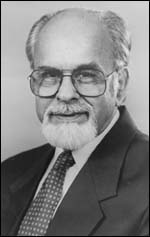H.D. Deve Gowda
 The Hindu-nationalist BJP emerged from the May 1996 national elections as the single-largest party in the Lok Sabha but without a parliamentary majority. Under Prime Minister Atal Bihari Vajpayee, the subsequent BJP coalition lasted only 13 days. With all political parties wishing to avoid another round of elections, a 14-party coalition led by the Janata Dal formed a government known as the United Front, under the former Chief Minister of Karnataka, H.D. Deve Gowda.
The Hindu-nationalist BJP emerged from the May 1996 national elections as the single-largest party in the Lok Sabha but without a parliamentary majority. Under Prime Minister Atal Bihari Vajpayee, the subsequent BJP coalition lasted only 13 days. With all political parties wishing to avoid another round of elections, a 14-party coalition led by the Janata Dal formed a government known as the United Front, under the former Chief Minister of Karnataka, H.D. Deve Gowda.
The national elections in India led to an orderly transition of power from the Congress Party led by the government of Prime Minister Rao, to the United Front Government led by Prime Minister H.D. Deve Gowda. Interestingly, the right of center Hindu BJP which won the most seats in last year's Indian election was unable to form a government. One issue of special interest to the United States is whether the United Front Government can meet the challenges, economic and political, that India faces domestically and in its dealings with the world at large. Some have argued that only a strong Indian Government can make significant progress in resolving India's problems, such as those involving its South Asia neighbors. That assertion clearly was not borne out by the Deve Gowda Government's performance.
Deve Gowda's government collapsed after less than a year, when the Congress Party withdrew its support in March 1997, forcing the third change in government in less than a year. Inder Kumar Gujral replaced Deve Gowda as the consensus choice for Prime Minister at the head of a 16-party United Front coalition.
On 21 April 1997, Inder Kumar Gujral was sworn in as Prime Minister with supporters hoping that his United Front coalition could stabilize India's shaky political scene. However, Gujral's coalition faltered in November 1997. The results of a February-March 1998 election produced a multi-party coalition led by the BJP with Atal Bihari Vajpayee again being named Prime Minister.
Son of Late Shri Avtar Narain Gujral and Late Smt. Pushpa Gujral, Shri Gujral is M.A., B.Com. Ph.D. & D.Litt. (Hons. Causa). He was born at Jhelum (in undivided Punjab) on 4th December 1919. He and Smt. Shiela Gujral were married on May 26, 1945. Shri Gujral belongs to a family of freedom fighters: both his parents participated in the freedom struggle in Punjab. At the young age of eleven, he himself actively participated in the freedom struggle in 1931 and was arrested and severely beaten by the police for organising movement of young children in the Jhelum town. In 1942, he was jailed during the Quit India Movement.
Before assuming the office of the Prime Minister of India, Shri Gujral was the Minister of External Affairs from June 1, 1996 and held additional charge of the Ministry of Water Resources from June 28, 1996. He was the Minister of External Affairs earlier during 1989-1990. He was Ambassador of India to U.S.S.R. (Cabinet Rank) from 1976-1980 and held the following Ministerial positions from 1967-1976: Minister of Communications & Parliamentary Affairs; Minister of Information & Broadcasting and Communications; Minister of Works & Housing; Minister of Information & Broadcasting; Minister of Planning.
Parliamentary positions held: Leader of the House, Rajya Sabha from June 1996; Chairman of Parliamentary Standing Committee on Commerce & Textiles, 1993 to April 1996; Member of Parliamentary Standing Committee for External Affairs - till April 1996; Member of Parliament 1964 to 1976, 1989 to 1991; re-elected to Rajya Sabha in 1992 from Bihar; Member, Committee on Petitions, Public Accounts Committee, Committee on Rules, Rajya Sabha; Committee on Subordinate Legislation, Rajya Sabha; General Purposes Committee, Rajya Sabha; Standing Committee on External Affairs.
|
NEWSLETTER
|
| Join the GlobalSecurity.org mailing list |
|
|
|

